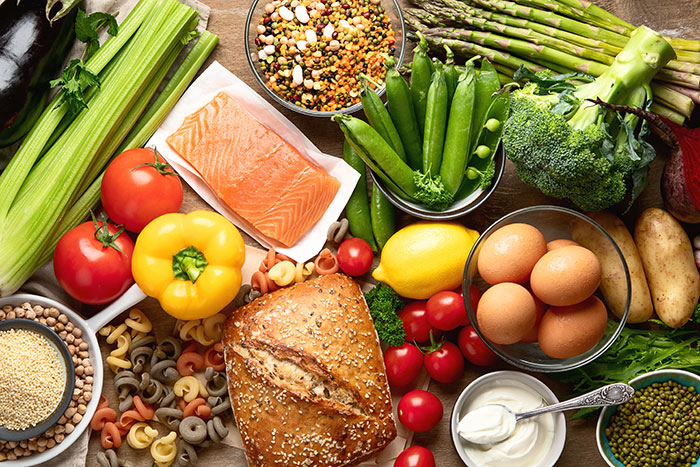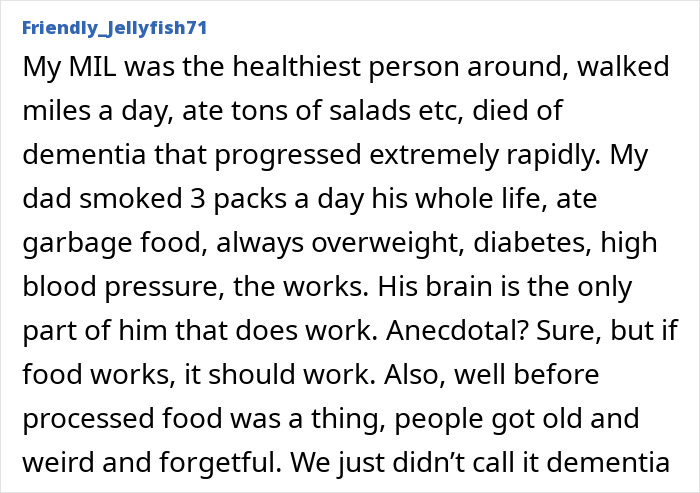A groundbreaking 15-year study has confirmed what many nutritionists have long suspected: diet plays a critical role in how the brain and body age, especially when it comes to the onset of dementia and other chronic illnesses.
“Our results show how important diet is in influencing the development of multimorbidity in ageing populations,” said Adrián Carballo-Casla, co-author of the study and postdoctoral researcher at the Aging Research Centre at the Karolinska Institutet.
- The study linked processed meats and sugary drinks to faster dementia and heart disease onset.
- Healthy diets like Mediterranean and MIND reduced chronic illness by two to three conditions.
- Ultra processed foods now make up over 50% of calories consumed at home in the US and UK.
The results point to a specific category of food, defined by high levels of processed ingredients. These are items most people wouldn’t consume if they weren’t artificially packaged and made palatable with added colorings and flavors.
The culprit is none other than processed red meats.
A 15-year-long study has finally reached its conclusion: processed red meats play a critical role in increasing the likelihood of dementia
Image credits: Joke Phatrapong/stock.adobe.com (Not the actual photo)
Researchers followed nearly 2,500 older adults and discovered that people who regularly consumed red processed meats, such as bacon, burgers, and sausages, along with sugary drinks, developed chronic illnesses like dementia at a significantly faster rate than those who followed healthier eating patterns.
The research, published in Nature Aging, drew from a Swedish study that began tracking participants with an average age of 71, over a 15-year period.
Image credits: toa555/stock.adobe.com (Not the actual photo)
Unlike others of its kind, the study didn’t force participants to adopt any type of specific diet. Instead, their normal eating patterns were scored according to the Alternative Healthy Eating Index (AHEI).
Created by Harvard researchers, this index penalizes sugary drinks, trans fats, and processed meats while rewarding plant-based foods and healthy fats.
On the opposite end, researchers used the Empirical Dietary Inflammatory Index (EDII) to identify diets high in inflammation-promoting foods.
The results were not surprising. Those whose diets scored high on the EDII developed neuropsychiatric conditions more rapidly than their healthier eating counterparts.
These foods create a form of long-term inflammation that builds up in the body as people age
Image credits: Markus Mainka/stock.adobe.com (Not the actual photo)
It’s important to understand what exactly the study was referring to when talking about inflammation.
The technical term is actually “inflammaging,” a concept that describes chronic, low-grade inflammation that gradually builds up in the body as people age.
Unlike acute inflammation, which is the body’s short-term response to injury or infection, this slow-burning form is more insidious.
It often goes unnoticed but contributes silently to the development of a wide range of age-related diseases, including Alzheimer’s, diabetes, heart disease, and certain cancers.
Image credits: Brock Wegner/Unsplash (Not the actual photo)
Researchers believe that poor diet, a lack of physical activity, and exposure to environmental toxins can all accelerate this internal inflammation and, in turn, speed up the biological aging process.
“By the end of the 15-year follow-up, participants with the healthiest diets had two to three fewer chronic conditions than those with the poorest diets,” the study read.
Ultra-processed foods have risen to account for more than half of all calories consumed by the average American
Image credits: Pixel-Shot/stock.adobe.com (Not the actual photo)
A separate study published in The Journal of Nutrition in December 2024 reinforced these concerns.
Researchers at Johns Hopkins Bloomberg School of Public Health analyzed dietary data from over 34,000 American adults and found that more than half of the calories consumed at home came from ultra processed foods.
That number rose steadily between 2003 and 2018, increasing from 51 to 54 percent.
Image credits: bit24/stock.adobe.com (Not the actual photo)
According to the lead author, Dr. Julia Wolfson, the issue is not as easy to avoid as it once was, as these items have found their way into even home-cooked meals.
“Ultra processed foods encompass many more products than just junk food or fast food,” Wolfson explained.
“The proliferation and ubiquity of these ingredients on grocery store shelves is changing what we are eating when we make meals at home.”
Ultra-processed foods contain a variety of synthetic additives that allow companies to disguise lower-quality products
Image credits: checocanto/Unsplash (Not the actual photo)
A similar situation is occurring in the United Kingdom, where a 2025 study warned that ultra-processed foods may be responsible for as many as 18,000 premature passings annually.
Researchers found similar data to Wolfson’s study, discovering that processed foods now make up more than half the average British diet, contributing to a surge in preventable chronic illnesses.
Image credits: bernardbodo/stock.adobe.com (Not the actual photo)
According to experts, what sets ultra-processed foods apart from traditional processed foods, like cheese or fresh bread, is their inclusion of synthetic additives that serve no nutritional purpose.
These ingredients are designed to enhance flavor, texture, or shelf life, but they often come at the expense of long-term health.
For instance, tomato sauce products that contain more water than actual tomatoes regularly use thickeners such as carrageenan, which is known to cause gastrointestinal ulcers in animal studies.
“We need strategies to help people choose less processed foods and avoid unhealthy ultra processed foods for meals consumed both at home and away,” said Wolfson.
“Stronger nutrition labels warning of high ultra processed content may also be necessary.”
Netizens argued that eating healthy simply isn’t affordable in the current economy
Thanks! Check out the results:
Total votes ·
Source link




























